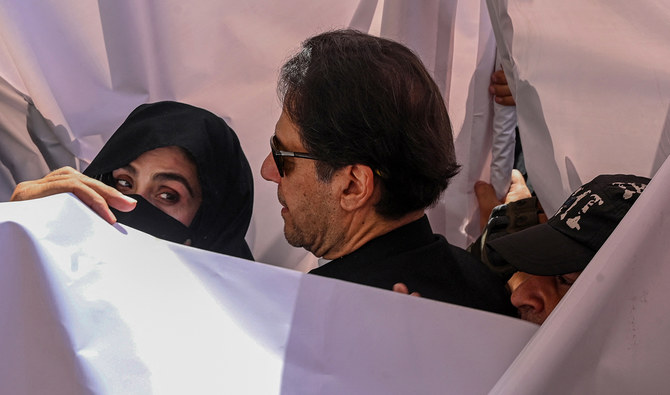ISLAMABAD: An accountability court in Pakistan’s Rawalpindi city on Tuesday granted pre-arrest bail to former prime minister Imran Khan’s wife in a corruption case, his lawyer confirmed, saying that no evidence had been found she had gained financial benefit from a trust.
Government officials allege Khan, 71, and his third wife Bushra Wattoo received land worth millions of dollars as a bribe from a real estate tycoon Malik Riaz Hussain through the Al-Qadir Trust, a non-governmental welfare organization set up by Wattoo and Khan in 2018 when he was still in office.
The trust runs a university outside Islamabad devoted to spirituality and Islamic teachings, a project inspired by the former first lady, who is also commonly known as Bushra Bibi and has a reputation as a spiritual healer.
“NAB court confirmed pre-arrest bail of Bushra Bibi today in Al Qadir Trust 190 million pounds case,” Barrister Salman Safdar, Khan’s lawyer, wrote on social media platform X.
“There was no evidence of financial gain; benefitting in any manner from the trust.”
Khan was briefly arrested on May 9 in connection with the case, with riots breaking out throughout the country that saw military and government installations attacked. The former prime minister was released shortly but was arrested in August in a separate case related to the sale of state gifts illegally.
The National Accountability Bureau (NAB), Pakistan’s corruption watchdog, filed a reference against Khan in December 2023 in the case. In February this year, the former prime minister and Wattoo were indicted by an accountability court.
Despite the bail, however, Wattoo will stay in prison as she is also serving a sentence in another case, where a trial court declared her marriage to Khan in 2018 as unlawful.
Local media reports said the prosecution presented three more witnesses in court during Tuesday’s hearing in the case, who were cross-examined by defense lawyers. The court summoned other witnesses in the next hearing, which was adjourned till July 5.
Khan, who is the founder of the Pakistan Tehreek-e-Insaf (PTI) party, has been in jail since last August and was convicted in some cases ahead of a national election in February. He is also fighting dozens of other cases which are continuing. Khan and his party say the charges were politically motivated to thwart his return to power.
In recent months, Pakistani courts have suspended Khan’s jail sentences in two cases about the illegal acquisition and sale of state gifts and also overturned his conviction on charges of leaking state secrets.
However, he has remained in prison due to the unlawful marriage case conviction. Khan also faces a trial under anti-terrorism charges in connection with the May 9 violence.
With input from Reuters


















